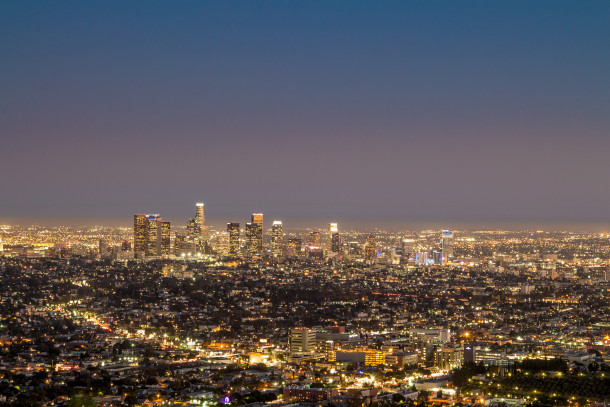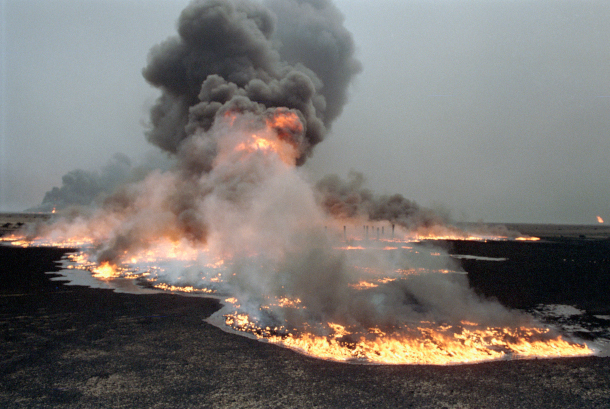Beyond the Headlines
Air Date: Week of July 29, 2022

A new study from Iowa State University revealed that light pollution from urban areas can fool plants into having longer growing seasons, in turn lengthening allergy season. Light pollution can come from buildings, street lamps, parking lots, and other urban infrastructure. (Photo: Saad Chaudhry on Unsplash)
This week, Environmental Health News editor Peter Dykstra tells Host Jenni Doering about how urban light pollution might be extending allergy season. A Congressional subcommittee pressures EPA to take Seresto flea collars off the market over safety concerns. They then look back 32 years to Iraq’s invasion of oil-rich Kuwait.
Transcript
BASCOMB: It’s Living on Earth, I’m Bobby Bascomb.
DOERING: And I'm Jenni Doering.
And it's time this week for a look Beyond the Headlines with Peter Dykstra. Peter is an editor with Environmental Health News, that's ehn.org and dailyclimate.org, and he joins us, as always, from Atlanta, Georgia. Hey, Peter, how you doing this week?
DYKSTRA: I'm doing well, Jenni, and I want to talk a little bit about allergies. They've vexed me my whole life. But according to new research from Iowa State University, allergies could be lasting longer during the growing season because of light pollution.
DOERING: Really? How exactly is light pollution related to pollen and allergies, Peter?
DYKSTRA: The research showed that because of light pollution from streetlights, homes and businesses, parking lots, anything like that, in urban areas, when those lights burn into the night, it can fool some plants into having a longer growing season. That means a longer time with pollen in the air. And that in turn is a hazard for anyone who gets the sneezes and sniffles from allergy time.
DOERING: Well, this is really surprising, Peter, because I use lights to help my indoor plants grow, but that's a very special kind of light. And we're talking here about just your regular old street lamps.
DYKSTRA: Yeah, we're talking about light everywhere, at least in urban areas, and how they can be a hazard in ways we hadn't anticipated.
DOERING: Guess light pollution is nothing to sneeze at.
DYKSTRA: Nothing to sneeze at, there's a good one.
DOERING: Well, especially when you think about the impacts it has on species like bats and migrating birds.
DYKSTRA: And humans.
DOERING: That's right. Well, what else do you have for us this week?

A Congressional subcommittee has asked EPA to remove Seresto, a flea and tick collar (not pictured) associated with pet injuries and deaths, from the market for the second time. (Photo: Mitchell Orr on Unsplash)
DYKSTRA: There's a congressional panel that for the second time has asked the Environmental Protection Agency to take Seresto off the market. If you're a pet owner, you probably know what Seresto is. It is a high-selling pesticide-laden collar made for both dogs and cats to keep the fleas away.
DOERING: That's right, Peter. You know, LOE has been reporting on the illnesses and deaths that have been linked to this flea collar from Seresto. And I think even some data from the EPA itself has shown a link between those.
DYKSTRA: Right, studies from both the EPA and the Canadian government show fairly compelling evidence that Seresto can have a negative effect on some dogs, anything from skin irritation to death.
DOERING: Well, what does this mean now that the House Oversight Committee has told EPA: do something?
DYKSTRA: It didn't mean anything last time, but this time around the information that they have, they say is conclusive that there's a real problem.
DOERING: Well, for those of us who consider our pets part of our family, I hope that we can figure out and sort of prevent these things from happening. Well, Peter, what do you have for us this week from the history vaults?
DYKSTRA: On August 2, 1990, Iraq invaded Kuwait. The Iraqi leader Saddam Hussein said that Kuwait was historically a part of the Iraqi empire. It was widely presumed to be an oil war.

When Iraqi forces retreated from Kuwait in the spring of 1991, they left behind hundreds of burning oil wells, releasing 1.5 billion barrels of oil into the environment - the largest intentional oil spill in human history. (Photo: United Nations Photo, Flickr, CC BY-NC-ND 2.0)
DOERING: And that war over oil back in 1990 and 91 was actually the subject of the very first Living on Earth broadcast. The show covered those burning oil wells that the Iraqi forces set on fire as they retreated.
DYKSTRA: That's right, hundreds of wells on land and in the Persian Gulf in the largest intentional oil spill ever.
DOERING: Wow. It's an ugly link between fossil fuels and war. And I guess we haven't gotten over it yet, Peter.
DYKSTRA: We vowed to get over it back in 1990 and 91. It's clear that we didn't. And how much longer before we move to a clean energy economy that gets us out of the cycle of addiction to fossil fuels?
DOERING: Indeed. Well, thank you so much, Peter, as always. Peter Dykstra is an editor with Environmental Health News, that's ehn.org and dailyclimate.org. And we'll talk to you next time.
DYKSTRA: Okay, Jenni, thanks a lot, and we'll talk to you next time.
DOERING: And there's more on these stories at the Living on Earth website. That's loe.org.
Links
Fast Company | “Allergies Lasting Longer? Blame Light Pollution”
Living on Earth wants to hear from you!
Living on Earth
62 Calef Highway, Suite 212
Lee, NH 03861
Telephone: 617-287-4121
E-mail: comments@loe.org
Newsletter [Click here]
Donate to Living on Earth!
Living on Earth is an independent media program and relies entirely on contributions from listeners and institutions supporting public service. Please donate now to preserve an independent environmental voice.
NewsletterLiving on Earth offers a weekly delivery of the show's rundown to your mailbox. Sign up for our newsletter today!
 Sailors For The Sea: Be the change you want to sea.
Sailors For The Sea: Be the change you want to sea.
 The Grantham Foundation for the Protection of the Environment: Committed to protecting and improving the health of the global environment.
The Grantham Foundation for the Protection of the Environment: Committed to protecting and improving the health of the global environment.
 Contribute to Living on Earth and receive, as our gift to you, an archival print of one of Mark Seth Lender's extraordinary wildlife photographs. Follow the link to see Mark's current collection of photographs.
Contribute to Living on Earth and receive, as our gift to you, an archival print of one of Mark Seth Lender's extraordinary wildlife photographs. Follow the link to see Mark's current collection of photographs.
 Buy a signed copy of Mark Seth Lender's book Smeagull the Seagull & support Living on Earth
Buy a signed copy of Mark Seth Lender's book Smeagull the Seagull & support Living on Earth

